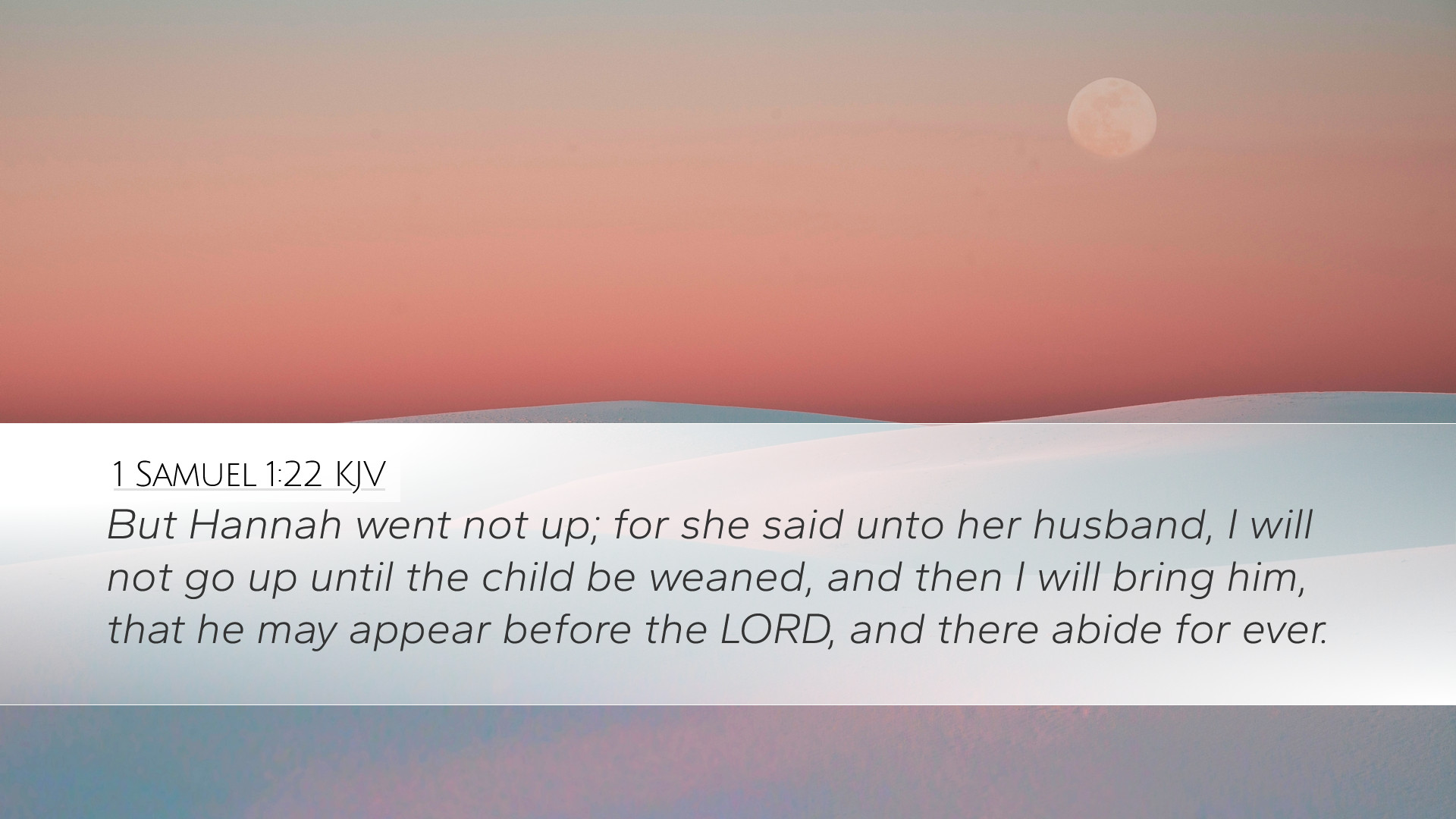Commentary on 1 Samuel 1:22
1 Samuel 1:22 states: "But Hannah went not up; for she said unto her husband, I will not go up until the child be weaned, and then I will bring him, that he may appear before the Lord, and there abide forever."
Introduction
This verse is a pivotal moment in the narrative of Hannah, a woman of profound faith and determination. In her vows to God, she promised to dedicate her son Samuel to the service of the Lord, illustrating the powerful themes of sacrifice, devotion, and faithfulness found throughout Scripture. The commentaries of Matthew Henry, Albert Barnes, and Adam Clarke offer rich insights into the implications and significance of this declaration.
Contextual Analysis
To fully appreciate this verse, it is essential to understand the context in which it is situated. Hannah had been deeply distressed due to her inability to bear children, which led her to fervently pray for a child. After receiving the promise of a son, she vowed to dedicate him to the Lord's service, a promise she takes very seriously as indicated by her decision to stay until Samuel is weaned.
Matthew Henry’s Commentary
Matthew Henry emphasizes the importance of Hannah’s vow and the gravity with which she treats it. He notes that Hannah’s decision not to go up to Shiloh immediately demonstrates her commitment to fulfill her promise to God:
- Devotion to God: Hannah's determination to wait until Samuel is weaned illustrates her deep devotion. She not only desires a son but is committed to ensuring that he is prepared to serve the Lord from a young age.
- Parental Responsibility: Henry points out that Hannah recognizes her role in the spiritual upbringing of her child. This highlights the responsibilities parents have in guiding and dedicating their offspring to God.
Albert Barnes’ Insights
Albert Barnes provides a practical interpretation of Hannah's actions:
- Significance of Weaning: Barnes explains that the weaning process is crucial in the spiritual preparation of Samuel. It symbolizes the time of growth and developmental readiness to serve God, suggesting that spiritual formation begins early in life.
- Commitment Over Tradition: He also notes that Hannah's choice reflects a prioritization of her vow over traditional pilgrimage practices, highlighting her personal relationship with God that transcends mere ritualism.
Adam Clarke’s Interpretation
Adam Clarke elaborates on the emotional and spiritual dimensions of Hannah's decision not to go up to the temple:
- Emotional Weight of Commitment: Clarke emphasizes the emotional struggle involved in Hannah's commitment. She had desired a child for so long, and now that she has one, she must relinquish him to God's service entirely.
- The Nature of Sacrifice: Clarke points out that Hannah's pledge highlights the nature of true sacrifice—putting God’s will above personal desires, a theme that resonates throughout the narrative of biblical characters.
Spiritual Lessons from the Verse
This verse invites readers to reflect on several spiritual principles:
- Faithfulness in Vows: Hannah's dedication reminds us of the importance of faithfulness in our commitments to God. When we promise something to the Lord, fulfilling that promise is essential.
- Preparation for Ministry: As seen in Hannah's weaning of Samuel, proper preparation is foundational for ministry. Believers are called to equip themselves and others before entering the service of the Lord.
- Personal Relationship with God: Hannah's actions model the significance of a personal relationship with God over mere tradition. Her journey illustrates the transformation that comes when one earnestly seeks the Lord.
Conclusion
1 Samuel 1:22 encapsulates a moment of profound faith and dedication. Hannah’s choice to prioritize her son’s readiness to serve God over cultural norms speaks volumes about the nature of true sacrifice and commitment in the life of a believer. The insights from Matthew Henry, Albert Barnes, and Adam Clarke enrich our understanding of this passage, providing a foundation for pastors, students, and scholars to explore the richness of Hannah's faith and the faithfulness of God.


